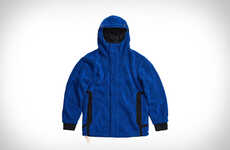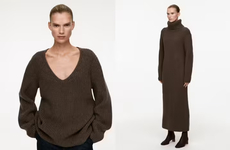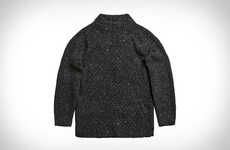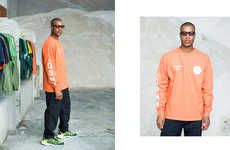
Benetton's 'TV31100' is an Environmentally Friendly Seamless Sweater
Laura McQuarrie — October 14, 2016 — Eco
References: benettongroup & sourcingjournalonline
Benetton is employing high-tech, forward-thinking and sustainable technology for the making of a new kind of seamless sweater that's being identified as the 'TV31100.'
The colorful TV31100 sweaters for men and women get their name from the the postal code of Benetton's first facility, established in 1965. The mechanical-sounding name of the product also reflects the fact that the garments are made on knitting machines sourced from Japan that use a sustainable technique called Whole Garment Technology, which minimizes yarn waste and as a result, their impact on the environment.
These basic pullover sweaters will be available as a limited-edition product that showcases Benetton as an innovator in the realm of knitting technology and sustainable fashion in the past and in the many years to come.
The colorful TV31100 sweaters for men and women get their name from the the postal code of Benetton's first facility, established in 1965. The mechanical-sounding name of the product also reflects the fact that the garments are made on knitting machines sourced from Japan that use a sustainable technique called Whole Garment Technology, which minimizes yarn waste and as a result, their impact on the environment.
These basic pullover sweaters will be available as a limited-edition product that showcases Benetton as an innovator in the realm of knitting technology and sustainable fashion in the past and in the many years to come.
Trend Themes
1. Sustainable Fashion - Explore sustainable and eco-friendly production techniques in the fashion industry, such as Whole Garment Technology.
2. Seamless Knitwear - Discover the benefits of seamless construction in knitwear, reducing waste and creating a sleek and comfortable design.
3. Limited-edition Products - Utilize limited-edition releases to showcase innovation and create buzz around new technology and techniques.
Industry Implications
1. Fashion - Apply sustainable fashion practices and seamless construction techniques to reduce environmental impact.
2. Textile - Adopt Whole Garment Technology in the textile industry to optimize production efficiency and minimize waste.
3. Retail - Leverage limited-edition releases to drive customer engagement and highlight brand innovation in the retail sector.
5.4
Score
Popularity
Activity
Freshness























